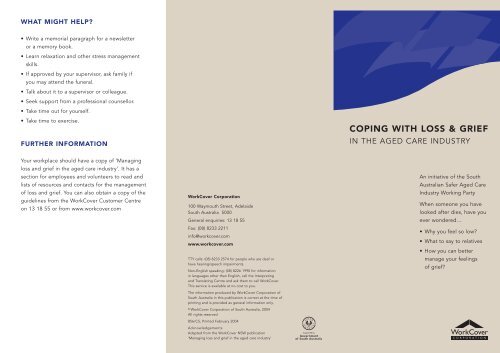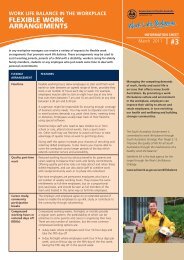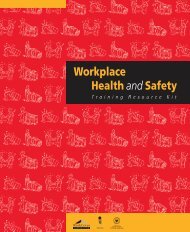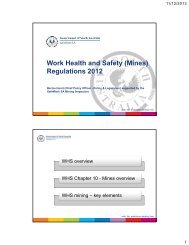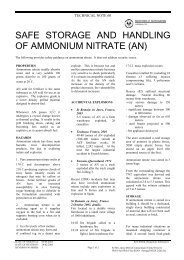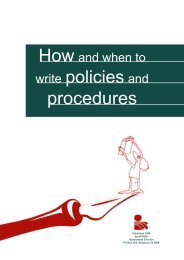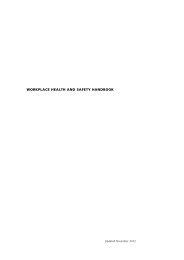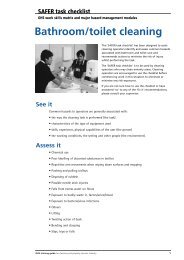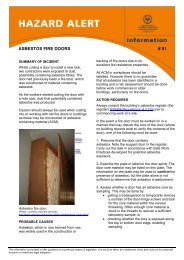Coping with loss and grief in the aged care industry ... - SafeWork SA
Coping with loss and grief in the aged care industry ... - SafeWork SA
Coping with loss and grief in the aged care industry ... - SafeWork SA
Create successful ePaper yourself
Turn your PDF publications into a flip-book with our unique Google optimized e-Paper software.
WHAT MIGHT HELP?<br />
• Write a memorial paragraph for a newsletter<br />
or a memory book.<br />
• Learn relaxation <strong>and</strong> o<strong>the</strong>r stress management<br />
skills.<br />
• If approved by your supervisor, ask family if<br />
you may attend <strong>the</strong> funeral.<br />
• Talk about it to a supervisor or colleague.<br />
• Seek support from a professional counsellor.<br />
• Take time out for yourself.<br />
• Take time to exercise.<br />
FURTHER INFORMATION<br />
Your workplace should have a copy of ‘Manag<strong>in</strong>g<br />
<strong>loss</strong> <strong>and</strong> <strong>grief</strong> <strong>in</strong> <strong>the</strong> <strong>aged</strong> <strong>care</strong> <strong>in</strong>dustry’. It has a<br />
section for employees <strong>and</strong> volunteers to read <strong>and</strong><br />
lists of resources <strong>and</strong> contacts for <strong>the</strong> management<br />
of <strong>loss</strong> <strong>and</strong> <strong>grief</strong>. You can also obta<strong>in</strong> a copy of <strong>the</strong><br />
guidel<strong>in</strong>es from <strong>the</strong> WorkCover Customer Centre<br />
on 13 18 55 or from www.workcover.com<br />
WorkCover Corporation<br />
100 Waymouth Street, Adelaide<br />
South Australia 5000<br />
General enquiries: 13 18 55<br />
Fax: (08) 8233 2211<br />
<strong>in</strong>fo@workcover.com<br />
www.workcover.com<br />
TTY calls: (08) 8233 2574 for people who are deaf or<br />
have hear<strong>in</strong>g/speech impairments.<br />
Non-English speak<strong>in</strong>g: (08) 8226 1990 for <strong>in</strong>formation<br />
<strong>in</strong> languages o<strong>the</strong>r than English, call <strong>the</strong> Interpret<strong>in</strong>g<br />
<strong>and</strong> Translat<strong>in</strong>g Centre <strong>and</strong> ask <strong>the</strong>m to call WorkCover.<br />
This service is available at no cost to you.<br />
The <strong>in</strong>formation produced by WorkCover Corporation of<br />
South Australia <strong>in</strong> this publication is correct at <strong>the</strong> time of<br />
pr<strong>in</strong>t<strong>in</strong>g <strong>and</strong> is provided as general <strong>in</strong>formation only.<br />
© WorkCover Corporation of South Australia, 2004<br />
All rights reserved<br />
856/CS, Pr<strong>in</strong>ted February 2004<br />
Acknowledgements<br />
Adapted from <strong>the</strong> WorkCover NSW publication<br />
‘Manag<strong>in</strong>g <strong>loss</strong> <strong>and</strong> <strong>grief</strong> <strong>in</strong> <strong>the</strong> <strong>aged</strong> <strong>care</strong> <strong>in</strong>dustry‘<br />
COPING WITH LOSS & GRIEF<br />
IN THE AGED CARE INDUSTRY<br />
An <strong>in</strong>itiative of <strong>the</strong> South<br />
Australian Safer Aged Care<br />
Industry Work<strong>in</strong>g Party<br />
When someone you have<br />
looked after dies, have you<br />
ever wondered…<br />
• Why you feel so low?<br />
• What to say to relatives<br />
• How you can better<br />
manage your feel<strong>in</strong>gs<br />
of <strong>grief</strong>?
WHAT IS GRIEF?<br />
When someone we have been close to dies we can<br />
feel sad, angry, relieved, stressed, tired, confused, <strong>and</strong><br />
guilty. Grief can cause confusion <strong>and</strong> anxiety, arous<strong>in</strong>g<br />
many conflict<strong>in</strong>g <strong>and</strong> bewilder<strong>in</strong>g emotions. It can<br />
leave you feel<strong>in</strong>g ach<strong>in</strong>g <strong>and</strong> exhausted, <strong>with</strong> doubts<br />
about your ability to cope at work, or even at home.<br />
Feel<strong>in</strong>gs of <strong>grief</strong> are different for everyone<br />
These feel<strong>in</strong>gs have no set time limits <strong>and</strong> are<br />
a normal reaction to <strong>loss</strong>.<br />
Unresolved <strong>grief</strong> may result <strong>in</strong> <strong>with</strong>draw<strong>in</strong>g from<br />
close or mean<strong>in</strong>gful <strong>in</strong>volvement <strong>with</strong> o<strong>the</strong>r residents,<br />
clients or colleagues. It may also contribute to<br />
long-term difficulties <strong>in</strong> a close relationship at<br />
home, <strong>in</strong>appropriate ways of deal<strong>in</strong>g <strong>with</strong> th<strong>in</strong>gs,<br />
depression, <strong>and</strong> even serious physical illness.<br />
WORKING WITH THE AGED<br />
Car<strong>in</strong>g for older people <strong>in</strong> <strong>the</strong>ir own home or<br />
residential <strong>aged</strong> <strong>care</strong> facilities br<strong>in</strong>gs <strong>aged</strong> <strong>care</strong><br />
workers <strong>in</strong>to very personal contact <strong>with</strong> <strong>the</strong>m. The<br />
implications for nurses, cleaners, doctors, office staff,<br />
<strong>care</strong>rs, volunteers, chapla<strong>in</strong>s, cooks, physio<strong>the</strong>rapists,<br />
diversional <strong>the</strong>rapists, students provid<strong>in</strong>g community<br />
<strong>care</strong> or <strong>in</strong>volved <strong>in</strong> work experience <strong>and</strong> o<strong>the</strong>r<br />
occupational groups <strong>in</strong> <strong>the</strong> <strong>aged</strong> <strong>care</strong> <strong>in</strong>dustry alike<br />
are profound.<br />
Work<strong>in</strong>g <strong>with</strong> <strong>the</strong> <strong>aged</strong>, br<strong>in</strong>gs enormous rewards:<br />
• Car<strong>in</strong>g for people.<br />
• Add<strong>in</strong>g quality to <strong>the</strong>ir lives.<br />
• Shar<strong>in</strong>g <strong>the</strong>ir pasts.<br />
• Be<strong>in</strong>g a valuable part of <strong>the</strong>ir present.<br />
With car<strong>in</strong>g comes <strong>the</strong> pa<strong>in</strong> <strong>the</strong> of <strong>loss</strong>.<br />
Sometimes griev<strong>in</strong>g at work can be difficult. Be aware<br />
of fellow workers <strong>and</strong> how <strong>the</strong>y are respond<strong>in</strong>g, try to<br />
rema<strong>in</strong> professional <strong>and</strong> try to be positive for <strong>the</strong> sake<br />
of o<strong>the</strong>r residents or clients.<br />
WHAT TO DO? WHAT TO <strong>SA</strong>Y?<br />
WHEN SOMEONE IS DYING:<br />
• Allow <strong>the</strong>m to raise all <strong>the</strong>ir fears.<br />
• Answer <strong>the</strong>ir questions honestly.<br />
• Be supportive of <strong>the</strong>ir beliefs <strong>and</strong> concerns.<br />
• If you feel out of your depth, get someone else.<br />
TO RELATIVES AND LOVED ONES:<br />
• Acknowledge <strong>the</strong>ir <strong>grief</strong>.<br />
• Share your emotions, it’s OK to cry.<br />
• Talk about <strong>the</strong> person who died<br />
(<strong>with</strong><strong>in</strong> <strong>the</strong> limits of confidentiality).<br />
• Answer all questions honestly.<br />
TO OTHER RESIDENTS:<br />
• Tell <strong>the</strong>m directly <strong>and</strong> <strong>with</strong> car<strong>in</strong>g.<br />
• Stay <strong>with</strong> <strong>the</strong>m to let <strong>the</strong>m respond.<br />
• Be accept<strong>in</strong>g of all responses.<br />
• Involve <strong>the</strong>m <strong>in</strong> th<strong>in</strong>gs like sign<strong>in</strong>g cards<br />
for relatives, or memorial services.<br />
No one ever compla<strong>in</strong>ed that someone cried;<br />
but <strong>the</strong>y have compla<strong>in</strong>ed that no one seemed<br />
to <strong>care</strong>.<br />
IDEAS FOR YOUR WORKPLACE<br />
• Hold memorial services for staff, residents,<br />
family <strong>and</strong> friends.<br />
• Set up <strong>grief</strong> boxes filled <strong>with</strong> sympathy cards,<br />
relaxation tapes, literature <strong>and</strong> photos.<br />
• Have formal debrief<strong>in</strong>gs <strong>with</strong> all staff, volunteers<br />
<strong>and</strong> o<strong>the</strong>rs <strong>in</strong>volved <strong>in</strong> <strong>the</strong>ir <strong>care</strong>. F<strong>in</strong>ish it<br />
<strong>with</strong> social time such as tea or dr<strong>in</strong>ks.<br />
• Organise workplace exercise or tai chi classes.<br />
• Make sure off-duty staff <strong>and</strong> volunteers that were<br />
close to <strong>the</strong> person who died are called at home.<br />
• Make sure students provid<strong>in</strong>g community <strong>care</strong><br />
or <strong>in</strong>volved <strong>in</strong> work experience that were close to<br />
<strong>the</strong> person who died are advised via <strong>the</strong> school<br />
contact person.<br />
• Set up a book of memories or a memorial column<br />
<strong>in</strong> your newsletter.<br />
• Involve staff <strong>and</strong> volunteers from all occupational<br />
groups <strong>in</strong> team meet<strong>in</strong>gs <strong>and</strong> social events.<br />
• Survey staff to identify what <strong>the</strong>y need.<br />
WRITE YOUR OWN IDEAS HERE:


